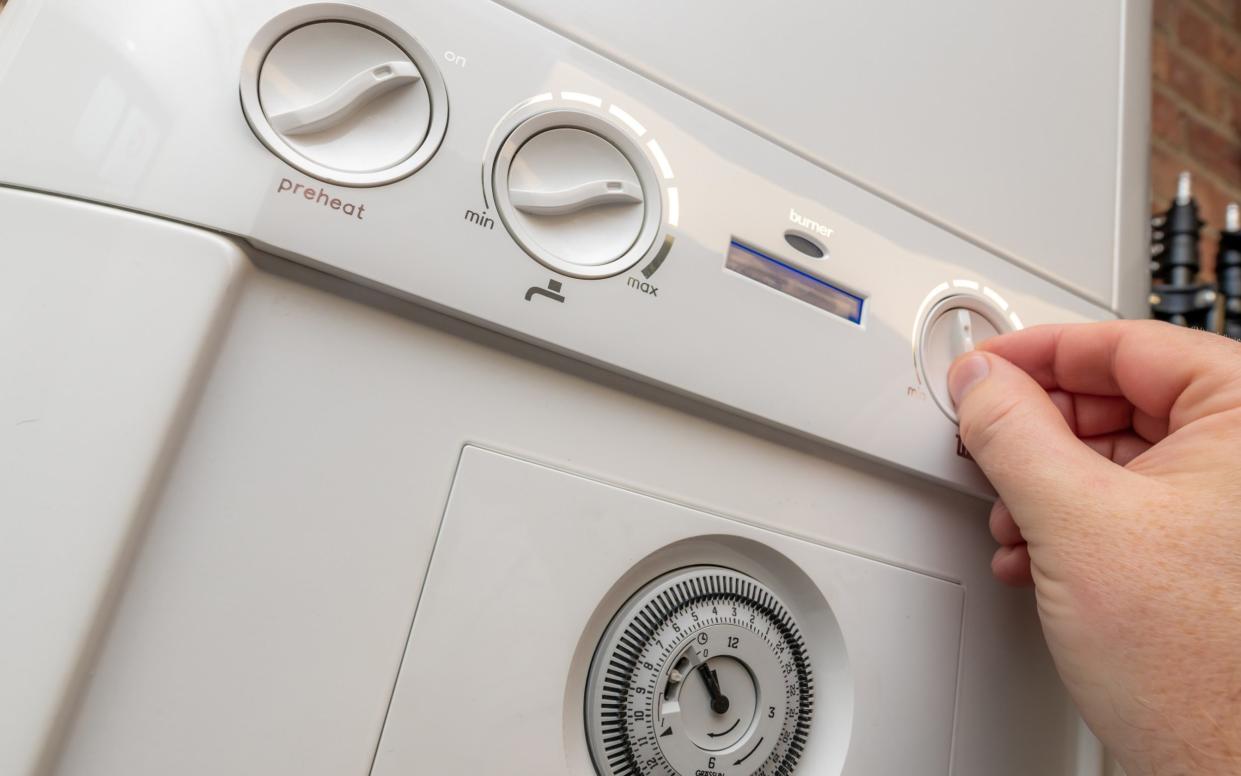Military shuns heat pumps in favour of cheaper cutting-edge electric boilers

The military is shunning heat pumps and instead warming soldiers’ homes with cutting-edge electric boilers that cost less to run.
Ministry of Defence (MoD) officials have been working on “Project Nixie” since 2020, The Telegraph can reveal, focusing on finding alternatives to heat pumps for barracks.
Much of the MoD’s domestic building stock is not suitable for heat pumps, which have only been fitted in a “very small proportion” of military homes.
An MoD spokesperson said that the project was launched to find a cheaper alternative to heat pumps, which require comprehensive and expensive work to a property before installation.
One possible solution is by using Cylo boilers, which the Telegraph understands are currently being fitted in four homes at the Duke of Gloucester Barracks in South Cerney, Glos, as part of a pilot project due to start early in 2024.
Cylo is a fridge-sized, emission-free electric boiler that is cheaper to run and more effective than a heat pump.
It is also greener than a gas boiler and requires no major works to a building before it can be installed.
The boiler uses a pressurised water tank as a thermal battery, using off-peak and cheap electricity to create a “heat reservoir” that then powers radiators when needed.
Standing around 6ft tall and weighing around 250kg before being filled with water, it can be fitted in a ground floor room or on the outside of a building.

The product currently costs around £20,000 per unit, but manufacturers believe that the cost of the product will lower with time.
It is not available commercially but is being sold to large landlords, such as government departments and councils.
Documents show that the MoD paid about £5,000 to install each of the four trial devices, similar to the cost of installing a traditional gas boiler.
The device can be easily fitted to old buildings, with no work needed other than removing the old boiler and connecting it to pre-existing electrics and plumbing.
It warms water as effectively as a gas boiler, its makers claim, is cheaper to run and can be used with variable tariffs.
Heat pumps, however, are unable to warm radiators as effectively, meaning measures to improve home energy efficiency are often needed, such as roof and wall insulation, new windows and doors and bigger radiators – costs that can run to tens of thousands of pounds for older houses.
The Government offers a grant of up to £7,500 for heat pump installation but does not cover the costs of making a house ready for a heat pump.
The Government admits that solid wall insulation itself can cost £15,000 on older houses.
Analysis suggests that combining a Cylo electric boiler with solar panels – as at the Duke of Gloucester trial – results in 18 per cent lower annual running costs than a heat pump.
The military is understood to be moving in four families to the homes with Cylo boilers in the new year and if the trial is successful then the scheme may be rolled out nationwide to the entire entire military housing estate. The homes are also expected to be fitted with solar panels.
Device can last for 40 years
Cylo’s makers Remit Zero claim that the device can last for 40 years, while because it is a closed system it does not need to be opened for maintenance, and it makes no direct CO2 emissions because it does not use gas.
Andy Slaney, the CEO of RemitZero, said that unlike heat pumps, Cylo boilers are quiet and easy to install for a standard plumber and can heat radiators to hot temperatures instead of only lukewarm.
“There are some realities with heat pumps that are, I think, a bit of an inconvenient truth,” he said.
“They are reasonably complex pieces of kit; they have a finite life; they require quite extensive maintenance; they require electricity when heat is required; their efficiency drops off when it’s cold.
“You tend to need larger radiators and larger diameter pipe work and you need a more thermally qualified building so you can cope with a lower flow temperature.”
“At the moment, my belief is that carbon reduction and net zero is a bit of a middle-class subject, and I think for it to succeed it’s got to be accessible to all and easy to use,” Mr Slaney added.
“There’s no complicated fans and pumps and all the things that you would see associated with a heat pump installation with Cylo. For many households, this could be a great solution and that’s what we’re trying to prove with the trials over the next few months.”
The MoD is spending two weeks installing and checking the boilers at the four homes in December and installation was due to finish before Christmas. The homes are currently empty and military families will move in in the new year.

The Telegraph understands that the families will give regular feedback, as well as having smart meters fitted to track the project and daily visits.
An MoD spokesman told The Telegraph: “If Project Nixie is successful it could have the potential to both reduce carbon emissions across the defence estate and reduce energy bills for service personnel and their families.
“We’re committed to delivering sustainable high-quality housing that meets the needs of those who serve our country.”
Cylo, which was invented by Prof Jeremy Miller of Brunel University, has a UK-only supply chain and is also being trialled by East Devon council in early 2024. Ten homes are set to be fitted with Cylo, The Telegraph understands, and should be ready for use by March.
The council said that the project is aiming to “decarbonise council homes and provide tenants with affordable warmth”.
It added: “Cylo is a ground-breaking technology that provides zero emission affordable heating and hot water.
“Cylo is particularly well-suited to homes occupied by those on lower incomes given its ability to store electrical energy as heat during low-cost periods.”
A combi Cylo boiler for hot water and central heating is in development and the team is also hoping to create a larger version that would work for bigger sites, such as schools and shops.

 Yahoo News
Yahoo News 
